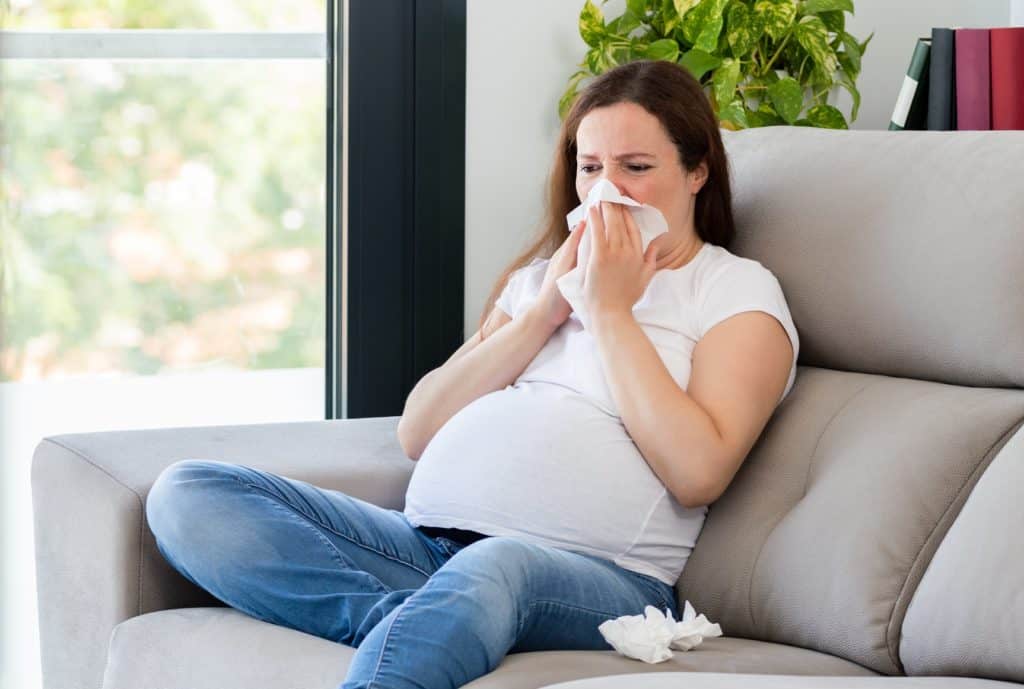
Table of Contents
Pregnancy is a cluster of bizarre side effects and just when you think you know about all of them, you get a nosebleed. However, don’t worry because nosebleeds are common and usually harmless during pregnancy.
Although this “side effect” may seem unusual, it is pretty common because 20 % of women who are expecting experience nosebleeds. This means roughly 1 in every 5 pregnant women experience nosebleeds. On the other hand, only 6 % of women experience them while not pregnant. Although nosebleeds can be messy and annoying, it does not indicate that anything’s wrong.
Keep on reading to understand why you’re getting nosebleeds while pregnant and what you should do about them.
Are Bloody Noses Common During Pregnancy?
Yes, they are common. A nosebleed happens when there’s a loss of blood from the tissues lining the nose. Pregnancy can expand the blood vessels present in your nose, which makes them prone to breaking and bleeding more easily. 20 % of expecting women experience nosebleeds in comparison with 6 % of non-pregnant women. Luckily, if you experience an occasionally minor nosebleed, it is usually harmless. Some healthcare providers say that a few nosebleeds throughout pregnancy are not a cause for alarm.
When Do Nosebleeds Generally Start During Pregnancy?
You can expect the irritating stuffiness in your nose which is sometimes accompanied by nosebleeds, especially if you’re blowing way too often, to usually start around week 16 of your pregnancy. Sadly, it usually sticks with you or sometimes gets worse towards the very end. So, make sure that you’re keeping a tissue at hand!
What Causes Nosebleeds During Pregnancy?
When you’re pregnant, there are a couple of things that could lead to nosebleeds. In addition to the expansion of blood vessels which makes you more susceptible to nosebleeds, you’re more likely to get a nosebleed if you
- Are suffering from a sinus infection
- Are suffering from a cold
- Are Suffering from allergies
- In cold weather, airline cabins, air-conditioned rooms, and other environments with dry air, your nasal membranes dry out.
- There is an injury to the area.
- You have been using chemical irritants, for instance, nasal medicines or drugs that are sprayed or snorted.
- Are suffering from a certain medical condition, such as high blood pressure or a clotting disorder
How Does One Stop a Nosebleed During Pregnancy?
Follow these steps, if you are experiencing a bloody nose during pregnancy:
- First, you should sit down and lean forward a bit, while keeping your head higher than your heart.
- Then, use your thumb and index finger to firmly pinch the soft lower part of your nose (that’s both nostrils).
- Next, breathe in through your mouth, then squeeze your nostrils closed for about 10 to 15 minutes. Don’t slack off to check to see if your nosebleed has stopped before the allotted time. It could intervene with clotting. You should probably set a timer.
- Finally, apply ice to compress the blood vessels to slow the bleeding down. With the hand that’s not pinching your nostrils closed, hold a bag of frozen peas or a cold pack over the bridge of your nose.
Remember: Do not cram your nose with tissues or gauze. Also, make sure that you don’t lie down or tilt your head back because you might end up swallowing blood. Doing this can cause nausea and vomiting or you could even accidentally inhale some blood into your lungs. Continue for another 10 to 15 minutes, if the bleeding hasn’t stopped after 15 minutes of applying pressure and ice.
When to Contact Your Healthcare Provider About Nosebleeds During Pregnancy?
You should consult a healthcare provider if you have incessant or chronic nosebleeds during pregnancy. They would most likely do an exam to rule out any serious problems. Experiencing nosebleeds frequently could be a symptom of something else, for instance, a bleeding disorder or high blood pressure. However, there are times when a nosebleed during pregnancy would require immediate medical attention.
So, contact 911 or have someone drive you to the emergency room if you have the following:
- Bleeding doesn’t stop even after 30 minutes of pressure.
- Extremely heavy blood flow.
- If you are having trouble breathing because of the bleeding.
- If you get a nosebleed after a head injury. Even if the bleeding is minor.
- If you experience fatigue, lightheadedness, or disorientation because of the bleeding.
- Turning pale from the bleeding.
- Experiencing pain in your chest.
- You think you might have a broken nose.
- If you are taking blood thinners and you are experiencing a nosebleed.
How to Prevent Nosebleeds During Pregnancy?
Even though you cannot prevent all kinds of nosebleeds, you could do certain things to stop irritating your sensitive nasal blood vessels.
1. Moisturizing The Inside of Your Nose
You could use a bit of lubricant such as saline nasal gel to prevent dryness or irritated nasal passages. A lot of experts recommend using petroleum jelly, while others suggest using a water-based lubricant that’s available over the counter at pharmacies. Also, saline nose drops or sprays can help, too.
2. Humidifier
Adding a little moisture to the air can do wonders because dry air can increase the risk of nosebleeds. Try using a humidifier inside your home, especially if you live in a dry climate or during the winter. Remember to not overheat your bedroom. Also, stay away from irritants like smoke.
3. Keeping Yourself Hydrated
Drink plenty of fluids to ensure that your mucous membranes remain hydrated, which makes them less likely to dry out and crack.
4. Blow Your Nose Gently
Sometimes blowing your nose too hard can cause a nosebleed. Especially after a nosebleed, because your nose needs to heal, so blowing too hard or stuffing tissues in your nostrils can prolong bleeding.
5. Sneezing:
When you sneeze, try to keep your mouth open so that the pressure of your sneeze is distributed rather than concentrating all of it on your nose.
6. Treating Allergies and Colds
Consult your health care provider about which over-the-counter medications will be best for you.
7. Overusing:
If your health care provider prescribes a medicated decongestant or a nose spray, take it exactly as instructed, meaning don’t overuse it. These medications tend to dry out and further annoy your nose.
It can get a little unnerving to be bleeding, even though nosebleeds are common during pregnancy. If you’re ever in doubt or are worried about it, remember to consult your doctor. Also, you might feel prepared if you read our article on Early Pregnancy Symptoms.
In Conclusion
Like we mentioned, nosebleeds are usually nothing to worry about. They are more common during pregnancy than when you aren’t. However, let your health care provider know if your nosebleed lasts longer than 10 minutes or if it is very heavy. Also, consult your health care provider right away if you have other symptoms along with a bleeding nose.
FAQs on Stuffy Nose & Nosebleeds During Pregnancy
1) Are colds worse when pregnant?
2) Does a stuffy nose mean I'm pregnant?
3) Does sneezing hurt my baby?
Sources:
Reviewed By:

Esha Chainani - Obstetrician and Gynaecologist
Dr. Esha Chainani is an Obstetrician, Gynaecologist, and laparoscopic surgeon who aims to break the stigma around women’s health by advocating an inclusive and open practice of obstetrics and gynecology and an author of several internationally published research papers and health articles in the media like the Swaddle.
She also founded Premaa, a non-profit to reduce maternal morbidity and eventual maternal mortality by providing lower-income pregnant women living in urban areas with cell phone access through an app that can feature an entire section about contraception as well for a whole gamut of reproductive health.
A panel for multiple health sessions including with the UN, USAID, BMC, gender at work, and multiple non-profit organisations, and is on the advisory panel of the South Indian medical students association.









